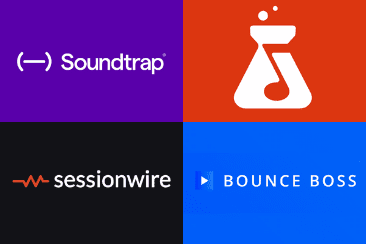A nurtured love of music can turn itself into a music degree and where that degree can take you is limitless. A music degree can open many doors in the music industry for you. Some notable names with a music degree are James May, John Williams and James Horner. But what can I do with a music degree? Where do I start? We’re here to answer these questions and much more on the matter.

In this article, we’re going to take a look at what jobs you can do with a music degree. Additionally, we will touch on some typical employers in the music industry and much more.
Be sure to stay tuned until the very end so you don’t miss out on any key information!
Jobs For People With Music Degrees

In this section, we will take a look at potential careers you could consider with a music degree. We will look at both jobs directly related to a music degree and jobs where your degree will be useful. Let’s take a look at what jobs can I get with a music degree.
Jobs Directly Related To A Music Degree
Here are some careers that relate directly to a music degree:
- Music producer
- Music therapist
- Musician
- Private music teacher
- Secondary school teacher
- Sound designer
- Sound engineer
- Sound technician, broadcasting/film/video
- Special effects technician
Jobs Where A Music Degree Would Be Useful
Here are some jobs that, while a music degree isn’t necessarily essential, it will certainly come in handy:
- Arts administrator
- Broadcast engineer
- Choreographer
- Community arts worker
- Event manager
- Marketing executive
- Private tutor
- Radio broadcast assistant
- Radio producer
- Talent agent
- Theatre stage manager
Which Careers Attract Creative Arts Students?
Media and advertising was the most popular career choice for creative arts and design students. This was taken from and identified by a 2020 survey of more than 71,000 undergraduates. This research was carried out by Cibyl, a research business owned by the same company as TARGETjobs.
Just over one in ten (10.9%) of students of creative arts and design, a group of subjects that includes music, who participated in the survey said they were interested in this area.
Gain Work Experience

Getting exposure to as many different musical genres as possible will increase your knowledge of music and help you to decide which direction you would like your career to take.
Listening to live music and performing allows you to assess musical ability, interact with audiences, and be exposed to new musical ideas.
Get involved in performances through, for example, joining your university’s music society and other music groups such as choirs, orchestras, ensembles, and musical theatre.
Some university courses include work placements in areas such as music education and instrumental teaching, recording and studio work, composition, and events management.
You could also pursue opportunities with music-related employers, for example schools, music festivals, or venues that regularly host musical acts.
Typical Employers In The Music Industry

You have a plethora of options open to you as a music graduate. You can choose to work in numerous professions inside and outside music.
Having a portfolio career is quite common if you follow a music career. You may end up working on both a freelance and contract basis. For example, you could combine teaching with freelance performance work, as well as doing contract/session work on particular projects.
Employers include:
- Music production companies – creative and administrative roles
- Music retailers
- Media organisations – including music magazines and licensing bodies
- Schools and colleges
- Orchestras, opera companies and touring companies
- Travel industry companies, e.g. hotels, summer camps and cruises
- Mental healthcare providers and charitable organisations
- The armed forces
- A range of employers in the cultural and creative industries including film and gaming companies.
If you are looking for an answer to the question ‘what can I do with a music business degree’ then the answer is slightly different to the question ‘what can I do with a music composition degree’. This is due to the fact that they are very different areas of the industry, so bear that in mind.
Enhance Your CV With Skills

A music degree can give you a broad range of skills that are worth including since many could be transferable. Some skills you may want to add onto your CV include:
- Creativity – developed through a range of creative projects
- Good physical dexterity, memory and concentration – developed in practice and performance
- Self-management – physical and mental self-discipline achieved through regular practice
- Communication skills – developed through performing and engaging listeners
- Teamwork – through working in bands or orchestras as a player, leader or manager
- Performing under pressure – overcoming nervousness in order to perform well during exams, concerts and auditions
- Planning and time management – organising and working towards a project/performance
- Technical skills and expertise – using technology to create and record music and studying acoustics
- Critical reflection – giving and receiving criticism, learning from mistakes and striving for improved performance
- Entrepreneurship – how to succeed in a competitive field.
Employers will recognise these skills you’ve gained throughout your years studying and hopefully will help you in the job hunt.
Take On Further Study

In some cases, music graduates choose to undertake further study in an area related to their first degree. This will allow them to specialise in a particular field, for example in composition or performance.
Some continue to pursue a range of qualifications in areas such as music performance, direction and instrumental or vocal teaching.
When you consider further study, you may want to think about a purely academic music qualification. Or perhaps degree options in community music, cultural management or musicology.
Additionally, you could also take further training in order to gain qualified teacher status (QTS). This will allow you to work as a music teacher at the secondary level.
Our Final Thoughts

So there we have it! There’s everything you need to know about what you can do with a music degree. We’ve touched on some jobs that directly correlate with having a music degree, such as musician and producer. We’ve also touched on some job options where a music degree will come in useful, such as a marketing executive. So what can I do with a music education degree? The answer is absolutely anything!
Once you have graduated with your music degree, it can be a nerve racking time. Whether you decide to stay in music or switch up your career path is entirely up to you. You are in charge of your own destiny. So if it’s your dream to become a musician, then go for it! If you don’t think the industry is your cup of tea, then by all means do something else which makes you happy!
What did you do after you got your music degree? We’d love to hear about your experience in the comments below. If you enjoyed this article, then why not share it on social media? Be sure to tag us @musicgateway!
If you enjoyed this article then why not check out another on our blog? Here are articles on How To Become A Tour Manager and How To Become A Music Journalist to get you started!










